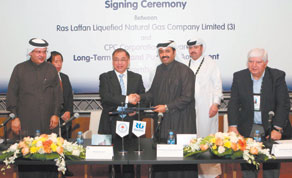 |
| HE the Minister of Energy and Industry, Dr Mohamed Saleh bin al-Sada, and CPC Chairman Shao-Hua Chu after RasGas signed a new long-term liquefied natural gas sales and purchase agreement with the Taiwan state-owned energy company CPC Corp |
Oil and gas producers need to keep on “investing massively” to prevent energy from becoming more expensive in future, said Total Chairman and CEO Christophe de Margerie.
“Everyone needs to be prepared for the fact that energy will remain expensive in future” de Margerie said in an exclusive interview with Gulf Times here.
On the potential impact of global economic turmoil on the energy industry, de Margerie said: “The energy industry is one of long investment cycles and as such it naturally requires stability rather than volatility and uncertainty. In the past, price volatility was mainly due to supply and demand imbalances. In such a situation, which I am afraid, will not disappear soon, large industry players like Total, need now more than ever, to stick to their long-term strategy and avoid ‘stop-and-go’ policies that cost a lot and contribute to creating a vicious circle by adding price volatility.”
On whether good sense will prevail over both energy producers and consumers in the interest of the global economy, de Margerie said: “It depends on what you really mean by ‘good sense’ and ‘the interest of the global economy.”
“Typically for us, being a major international company involved all along the energy value-chain, good sense in the interest of the global economy” means finding ways to balance supply and demand of energy in a sustainable way over the long-term. Today, the challenge we share with the countries with which we live is to contribute to balancing the energy mix for the future while continuing to produce enough energy to match a still growing demand from emerging countries.
“As everyone knows, but sometimes tends to forget, fossil energy resources are quite abundant; they will continue to represent more than three-fourths of energy consumption in the next 20 years. But many experts now agree on the fact that come 2020, oil production should stop increasing and start stabilising, mainly because the challenges we face to put new large resources into production are ever-increasing: geopolitics, technology, cost and financing issues and last but not least, acceptability of large oil and gas developments,” de Margerie said.
Further to oil and gas which remain Total’s core activities, the energy major is “considering seriously different options” in renewable energy, he said.
“For many years now, we have been involved in solar energy, and rank today as a major player in the world. Of course, the diversification of the energy supply is of utmost importance in the coming decades, but finding a balance between supply and demand of energy also depends largely on the ability of political authorities and consumers to face realistically scarcity constraints and thus seek to reduce their consumption.”
De Margerie said: “I would say ‘good sense’ will prevail in the world of energy if every player involved- producers and consumers alike, share the common view that the future of energy will be one of a ‘soft transition’ whereby fossil energy will be more and more complemented with other energies, energy efficiency being central alongside the necessary satisfaction of peoples’ needs as well as environmental impacts and costs. Rather than ‘beyond petroleum’ our future – and for a long time - is ‘alongside petroleum’!”
Doha’s choice shows positive change
Doha’s selection as host of the 20th WPC is symbolic of positive change in the region, reflecting as it does Qatar’s transformation into an energy producer of global standing, said Total Chairman and CEO, Christophe de Margerie. “We are honored to be a platinum sponsor of the Congress in Qatar as this also coincides with something I am all the more proud of our 75th year of partnership with our Qatari friends,” de Margerie told Gulf Times here.

